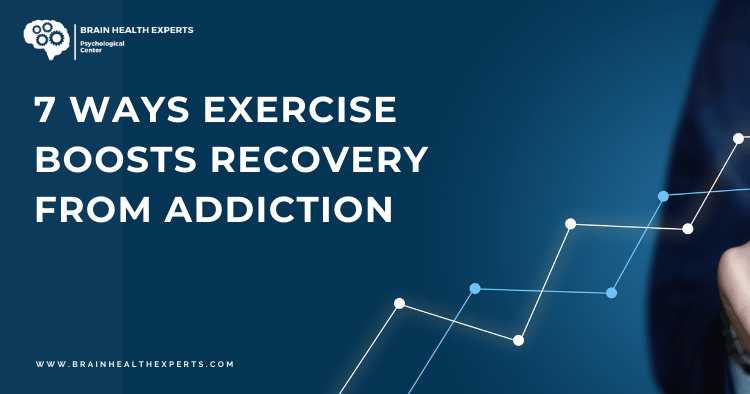Table of Contents
- Introduction
- 1. Enhances Mood and Reduces Stress
- 2. Provides Structure and Routine
- 3. Increases Physical Health
- 4. Builds a Supportive Community
- 5. Boosts Self-Esteem and Confidence
- 6. Redirects Focus and Energy
- 7. Improves Sleep Quality
- Conclusion
- FAQs
Introduction
Recovering from addiction is a challenging journey that often requires a multi-faceted approach. While therapy and support groups are crucial, incorporating exercise into your recovery plan can offer tremendous benefits. Regular physical activity not only promotes physical health but also aids in emotional and mental well-being. In this article, we will explore seven ways exercise can boost recovery from addiction and provide you with actionable insights.
1. Enhances Mood and Reduces Stress
Exercise is a powerful tool for enhancing mood. When you engage in physical activity, your body releases endorphins, often referred to as “feel-good” hormones. These natural chemicals can help alleviate feelings of anxiety and depression, which are common during addiction recovery.
“Exercise is a natural antidepressant, offering immediate relief from stress and anxiety.”
The Science Behind It
According to the Mayo Clinic, even moderate exercise can significantly improve mood and reduce stress levels. Whether it’s a brisk walk or a high-intensity workout, your body responds positively, helping you combat cravings and negative emotions. Learn more about the benefits of exercise on mood here.
2. Provides Structure and Routine
Establishing a daily routine is essential for anyone in recovery. Exercise can provide a structured activity to incorporate into your day, helping to fill the time that may have been spent on unhealthy habits.
“Creating a schedule can anchor your day, making it easier to stay focused on your recovery goals.”
Benefits of Structure
Having a set schedule for exercise can help you develop discipline and accountability. This routine can also create a sense of normalcy and stability, which is vital during recovery.
How to Get Started
- Set specific workout times each week.
- Use a calendar or app to track your progress and stay motivated.
3. Increases Physical Health
Physical health plays a crucial role in the recovery process. Regular exercise can improve cardiovascular health, increase strength, and enhance overall fitness levels. This physical improvement can help rebuild the damage caused by addiction.
“Every step you take towards fitness is a step away from addiction.”
Health Benefits
Engaging in exercise can lead to:
- Improved immune system function
- Better weight management
- Lower risk of chronic diseases
Suggested Activities
- Cardio exercises like running or cycling
- Strength training with weights or resistance bands
- Flexibility exercises such as yoga or Pilates
4. Builds a Supportive Community
Joining a fitness class or a sports group can be an excellent way to connect with others who share similar goals. This social aspect of exercise can provide additional support during your recovery journey.
“A supportive community can be the backbone of your recovery, offering encouragement when you need it most.”
Community Benefits
Being part of a group can help you feel less isolated and more connected. Social interactions can also foster accountability and encouragement, making it easier to stay committed to your fitness goals.
How to Connect
- Look for local fitness classes or community sports leagues.
- Join online communities or forums dedicated to fitness and recovery.
5. Boosts Self-Esteem and Confidence
As you progress in your fitness journey, you may notice improvements in your physical appearance and overall health. This can lead to a significant boost in self-esteem, which is crucial for anyone recovering from addiction.
“Building physical strength translates into personal strength, empowering you on your path to recovery.”
The Connection to Recovery
Feeling good about yourself can reduce the likelihood of relapse. When you feel confident and strong, you’re more likely to resist cravings and temptations.
Building Confidence
- Set achievable fitness goals and celebrate your progress.
- Document your journey through a fitness journal.
Explore how positive thinking can enhance self-esteem and confidence in your recovery journey.
6. Redirects Focus and Energy
Exercise can be a healthy outlet for the energy and emotions that come with recovery. Instead of turning to substances, you can channel that energy into physical activity, which is both rewarding and beneficial.
“Redirecting your energy towards exercise can break the cycle of addiction and foster a healthier lifestyle.”
Mental Shift
Engaging in exercise can help you shift your focus away from cravings and negative thoughts. It offers a constructive way to deal with stress and anxiety, making it easier to cope with the challenges of recovery.
Recommended Activities
- Try high-intensity interval training (HIIT) to release pent-up energy.
- Explore new sports or activities that capture your interest.
7. Improves Sleep Quality
Quality sleep is crucial for recovery, yet many individuals in recovery struggle with insomnia or disrupted sleep patterns. Regular exercise can help improve the quality and duration of sleep, which is vital for both physical and mental health.
“Good sleep is the foundation for a successful recovery; exercise can help you build that foundation.”
How Exercise Helps Sleep
According to the National Sleep Foundation, individuals who engage in regular physical activity tend to fall asleep faster and enjoy deeper sleep. This can be particularly beneficial for those experiencing anxiety or restlessness during recovery.
Sleep Tips
- Aim for at least 30 minutes of exercise most days.
- Avoid intense workouts close to bedtime; opt for calming activities like stretching or yoga instead.
Discover effective techniques to boost your sleep hygiene for better mental health here.
Conclusion
Incorporating exercise into your recovery journey offers numerous benefits that support both physical and emotional healing. From enhancing mood to building a supportive community, the advantages of regular physical activity are undeniable. Remember, recovery is a personal journey, and finding the right balance of exercise and self-care can make all the difference.
FAQs
Q: How often should I exercise during recovery?
A: Aim for at least 150 minutes of moderate aerobic activity per week, combined with strength training on two or more days.
Q: What type of exercise is best for addiction recovery?
A: There is no one-size-fits-all answer. Choose activities that you enjoy and can commit to regularly, whether it’s running, swimming, yoga, or group sports.
Q: Can I start exercising if I’ve never done it before?
A: Absolutely! Start with simple, low-intensity activities and gradually increase intensity as you feel more comfortable.
Q: Should I consult a professional before starting an exercise program?
A: It’s a good idea, especially if you have underlying health conditions. A fitness professional can help you create a personalized plan that suits your needs.
Q: Can exercise replace therapy in addiction recovery?
A: No, exercise should complement professional treatment, not replace it. It can be a valuable addition to your overall recovery plan.
By integrating these seven strategies into your recovery journey, you can pave the way for a healthier, more fulfilling life. Remember, every step counts, and your journey is uniquely yours!





